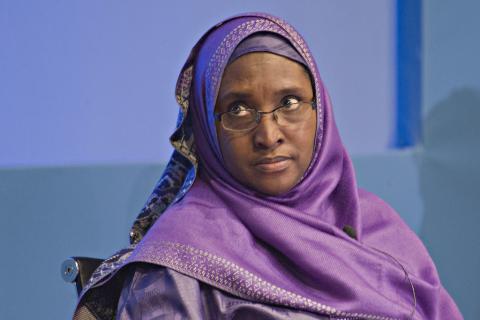
Speaking exclusively to Daily Trust, the Minister of State for Budget and National Planning, Zainab Shamsuna Ahmed, said the external debt is necessary because of the huge deficit in the 2018 budget.“The borrowing is one component of the funding, which is the major one for now and if we are not able to realise the two borrowing as projected in the budget, it will affect the performance of the budget,” she said.

The Federal Government has insisted that failure to obtain external debt as contained in the 2018 Appropriation Act will slow down the implementation of the capital component of the budget.
This is even as the Debt Management Office (DMO) put Nigeria’s debt profile at N22.38tn as of June 30, 2018.
Speaking exclusively to Daily Trust, the Minister of State for Budget and National Planning, Zainab Shamsuna Ahmed, said the external debt is necessary because of the huge deficit in the 2018 budget.
“The borrowing is one component of the funding, which is the major one for now and if we are not able to realise the two borrowing as projected in the budget, it will affect the performance of the budget,” she said.
The minister however said “that doesn’t mean that the budget will not be implemented because we have national revenue too.”
The N9.12 trillion 2018 budget has a deficit of N1.95 trillion, equivalent to 67 per cent of the total N2.87 trillion capital expenditure for the year. The deficit is to be financed mainly by borrowing of N1.643 trillion both from external and internal sources.
However, the government’s borrowing plan is yet to get the approval of the National Assembly as the lawmakers have since gone on 2-month recess.
According to a report presented by the DMO, Nigeria’s public debt status for the first half of the year indicated an increase of 3 percent debt increase within the period.
Presenting the report, the Director General of the DMO, Patience Oniha, said the country’s total public debt, which encompasses the domestic and external debt stock of the Federal and 36 States including the FCT, stood at N22.38 trillion as at June 30, 2018.
The DG noted that the 3.01 percent increase was marginal over the public debt stock for December 2017, adding that the increase in the public debt stock over the six months period was due to the 2.5 billion dollars Eurobond issued in February 2018.
She said the debt stock decreased to 1.44% when compared to the debt data for March 2018, “from N22.707 trillion in March 2018 to N22.38 trillion in June 2018,” adding that the “decrease was due to a 3.38 percent decline in the FGN’s domestic debt stock between March and June 2018”.
Oniha said there was a consistent decrease in the federal government domestic debt which declined from N12.589 trillion in December 2017 to N12.577 trillion in March 2018 and N12.151 trillion in June 2018.
According to the DG, the reduction in the FGN’s domestic debt stock followed the redemption of N198 billion Nigerian Treasury Bills in December 2017 and another N639 billion between January and June 2018. It will be recalled that a total of $3 billion was raised through Eurobonds to refinance maturing domestic debt as part of the implementation of the debt management strategy for the purpose of substituting high cost domestic debt with lower cost external debt to reduce debt service costs for the government.
The DG further noted that the implementation of the public debt management strategy to ensure that Nigeria’s debt is sustainable is already yielding positive results.
‘Domestic borrowing already commenced’
The minister told Daily Trust that the borrowing for the 2018 budget will be 50 per cent local and 50 per cent foreign and that the approval for the domestic borrowing was done when the Appropriation Act was passed by the National Assembly.
“We have the approval of the domestic borrowing. It is on-going. But we are not being able to do any foreign borrowing now until we get that extract of the resolution from the National Assembly.
“A request to that effect had been sent to the National Assembly before the commencement of the recent recess.
“I hope now that the Senate will reconvene they will address it, because we have been borrowing and financing the budget locally but we need the foreign borrowing to do the large capital expenditure,” she said.
The minister added that besides the loans, there are other sources of funding the budget such as oil and non-oil revenue and “other revenues from the government-owned enterprises which we classified as independent revenue and then borrowing.”
“So the borrowing is not alone, it also includes the recovery of the looted funds. They are all used as financing options to fund the budget,” she added.
Construction firms warn of poor capital release
Meanwhile, construction companies have warned that poor implementation of the 2018 budget will affect various on-going projects in the country.
The President of the Federation of the Construction Industry (FOCI), Engr. Nasiru A. Dantata, said his members will definitely be affected by late release of 2018 Capex funds for on-going projects.
According to him, the 2017 wonderful releases by the federal government have cleared a lot of the outstanding and his members are confident of same for 2018.
He however raised concern over new projects, noting that any late payment of advance may delay the projects mobilizations. “We are benefitting from the various special funds for key projects. There is an increased confidence with our members in the ability of the Federal Government to perform projects in a more timely manner,” he added.